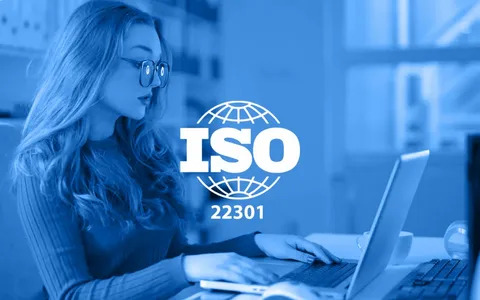Table of Contents
- Introduction
- What is ISO 22301 Certification?
- Why Business Continuity Matters
- Key Benefits of ISO 22301
- Step-by-Step Guide to Getting ISO 22301 Certified
- ISO 22301 vs Other ISO Standards
- Who Needs ISO 22301?
- Finding the Right Certification Partner
- Final Thoughts
- FAQs
Introduction
What happens when disaster strikes your business? Do you have a backup plan, or will operations grind to a halt? That’s where ISO 22301 certification comes in. It gives you the playbook for staying operational when things go sideways.
In a world of cyberattacks, pandemics, natural disasters, and supply chain issues, this standard helps you stay prepared, responsive, and strong. Let’s break it all down in simple, human language.
What is ISO 22301 Certification?
The Gold Standard for Business Continuity
ISO 22301 is the international standard for Business Continuity Management Systems (BCMS). It helps organizations of all types prepare for disruptions so they can maintain operations, protect assets, and recover quickly.
Whether it’s a cyber breach, fire, power outage, or supply chain failure, this standard gives you a clear, tested path forward.
Why Business Continuity Matters
It’s Not Just About Disaster Plans
Too often, businesses think of continuity as a “worst-case scenario” thing. But disruptions come in all shapes and sizes – think ransomware, bad weather, or even a key employee quitting unexpectedly.
ISO 22301 helps you:
- Minimize downtime
- Protect customer trust
- Keep data safe (data security compliance)
- Support disaster recovery planning
- Avoid massive financial losses
When you’re prepared, you respond faster and smarter.
Key Benefits of ISO 22301
1. Operational Resilience
Your business becomes more adaptive and better equipped to bounce back.
2. Risk Mitigation
Identify and control risks across departments—from IT to HR to logistics.
3. Customer Confidence
Clients, especially in B2B, love knowing their vendors won’t vanish during a crisis.
4. Legal and Regulatory Alignment
Meet regional and industry-specific continuity requirements without the scramble.
5. Competitive Advantage
ISO 22301 can give you the edge in contract bids and partnerships.
Step-by-Step Guide to Getting ISO 22301 Certified
Step 1: Perform a Gap Analysis
Where are your vulnerabilities? A gap analysis highlights where you are vs. where you need to be.
Step 2: Build Your BCMS
Start mapping your business processes, risk areas, and recovery plans.
Step 3: Document Everything
Clear policies and procedures are key. This documentation is the core of your BCMS.
Step 4: Train Your People
Resilience isn’t just a system – it’s a mindset. Everyone needs to know their role in a crisis.
Step 5: Run Drills and Tests
Simulate real-life disruptions. How fast can you recover from a system failure or data breach?
Step 6: Internal Audit
Check your system from the inside. Fix any weak links before the real audit.
Step 7: Certification Audit
Choose a reputable body offering ISO certification services in UK or globally. Once they verify your system, you’re officially certified.
Step 8: Monitor and Improve
Review your BCMS regularly. Keep it fresh and aligned with changing risks.
ISO 22301 vs Other ISO Standards
They all serve unique purposes, but together they form a strong defense. Here’s how ISO 22301 aligns with other ISO certifications:
| ISO Standard | Purpose | Why It Complements ISO 22301 |
|---|---|---|
| ISO 9001 | Quality Management | Ensures continuity of quality and service |
| ISO 27001 | Information Security | Protects data during and after disruptions |
| ISO 45001 | Occupational Health & Safety | Ensures safe crisis response |
| ISO 14001 | Environmental Management | Resilience to environmental threats |
| ISO 50001 | Energy Management | Prevents energy-related business interruptions |
ISO 22301 bridges across operations, safety, and data protection.
Who Needs ISO 22301?
It’s Not Just for Big Corporations
If your business provides essential services, stores sensitive data, or relies on digital systems, you need this certification. That includes:
- Financial institutions
- Healthcare providers
- Government agencies
- Tech and SaaS companies
- Retail and logistics firms
- Food manufacturers (food industry ISO certification)
Even SMEs can benefit. Many providers offer ISO certification services for small businesses UK tailored to your size.
Finding the Right Certification Partner
How to Choose Wisely
Not all certification bodies are equal. Look for ones with:
- Local knowledge (think ISO certification service London or UK-wide)
- Industry experience
- Support for multi-standard frameworks (like ISO 9001, ISO 14001, and ISO 27001 certification UK)
- Practical support, not just audits
They should also help you align ISO 22301 with other frameworks like:
- EMS certification (Environmental Management)
- Workplace safety standards
- Device safety and performance
Final Thoughts
Let’s be real: No one likes to think about things going wrong. But being unprepared? That’s a disaster waiting to happen.
ISO 22301 certification isn’t just a checkbox. It’s a mindset of resilience, a culture of readiness, and a way to keep your promises when it matters most.
So if you’re ready to lead through disruption, earn trust, and strengthen your systems, ISO 22301 is your blueprint.
Stay ready. Stay strong.
FAQs
1. How long does it take to get ISO 22301 certified?
Typically 3 to 9 months depending on your organization’s size, complexity, and existing systems.
2. Is ISO 22301 mandatory?
No, but some sectors or partners may require it. It’s a proactive choice that pays off during a crisis.
3. Can ISO 22301 be integrated with ISO 27001?
Yes! It’s a great combo for managing both information security and business continuity.
4. How often is recertification needed?
Usually every 3 years, with annual surveillance audits in between.
5. What if I run a small business?
Many providers offer ISO certification services for small businesses UK with flexible, cost-effective packages.
Sponsored article: Practical Online SEO Course | Live Classes & Certification

